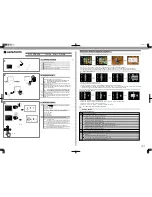
159
Maximizing Camera Life and Performance
Cari
ng for the C
a
mera
Cleaning
Do not use alcohol, thinner, or other volatile chemicals.
Storage
Turn the camera off when not in use. Be sure that the power-on lamp is off before
putting the camera away. Remove the battery if the camera will not be used for an
extended period. Do not store the camera with naphtha or camphor moth balls, or
in any of the following locations:
•
Next to equipment that produces strong electromagnetic fields, such as
televisions or radios
•
Exposed to temperatures below –10 °C (14 °F) or above 50 °C (122 °F)
•
Places that are poorly ventilated or subject to humidity of over 60%
To prevent mold or mildew, take the camera out of storage at least once a month.
Turn the camera on and release the shutter a few times before putting the camera
away again.
C
Notes on the Monitor
•
The monitor may contain a few pixels that are always lit or that do not light. This is a characteristic
common to all TFT LCD displays, and does not indicate a malfunction. Images recorded using the
product will not be affected.
•
White or colored streaks may be visible when bright subjects are framed in the monitor. This
phenomenon, known as “smear,” occurs when extremely bright light strikes the image sensor; it is
characteristic of image sensors and does not indicate a malfunction. Smear may also take the form
of partial discoloration in the monitor during shooting. It does not appear in images recorded with
the camera except in the cases of movies and of images recorded with
Multi-shot
1
6
selected for
Continuous
. When shooting in these modes, we recommend that you avoid bright subjects such
as the sun, reflected sunlight, and electric lights.
•
Images in the monitor may be difficult to see under bright lighting.
•
The monitor is lit by an LED backlight. Should the monitor begin to dim or flicker, contact your
Nikon-authorized service representative.
Lens
Avoid touching glass parts with your fingers. Remove dust or lint with a blower
(typically a small device with a rubber bulb attached to one end that is
pumped to produce a stream of air out the other end). To remove fingerprints
or other stains that cannot be removed with a blower, wipe the lens with a soft
cloth, using a spiral motion that starts at the center of the lens and working
toward the edges. If this fails, clean the lens using a cloth lightly dampened
with commercial lens cleaner.
Monitor
Remove dust or lint with a blower. To remove fingerprints and other stains,
clean the monitor with a soft, dry cloth, being careful not to apply pressure.
Body
Use a blower to remove dust, dirt or sand, then wipe gently with a soft, dry
cloth. After using the camera at the beach or other sandy or dusty
environment, wipe off any sand, dust, or salt with a dry cloth lightly dampened
with fresh water and dry thoroughly.
Note that foreign matter inside the
camera could cause damage not covered by the warranty.
Summary of Contents for COOLPIX S4000
Page 194: ...182 Index Technical Notes and Index ...
Page 195: ......
















































